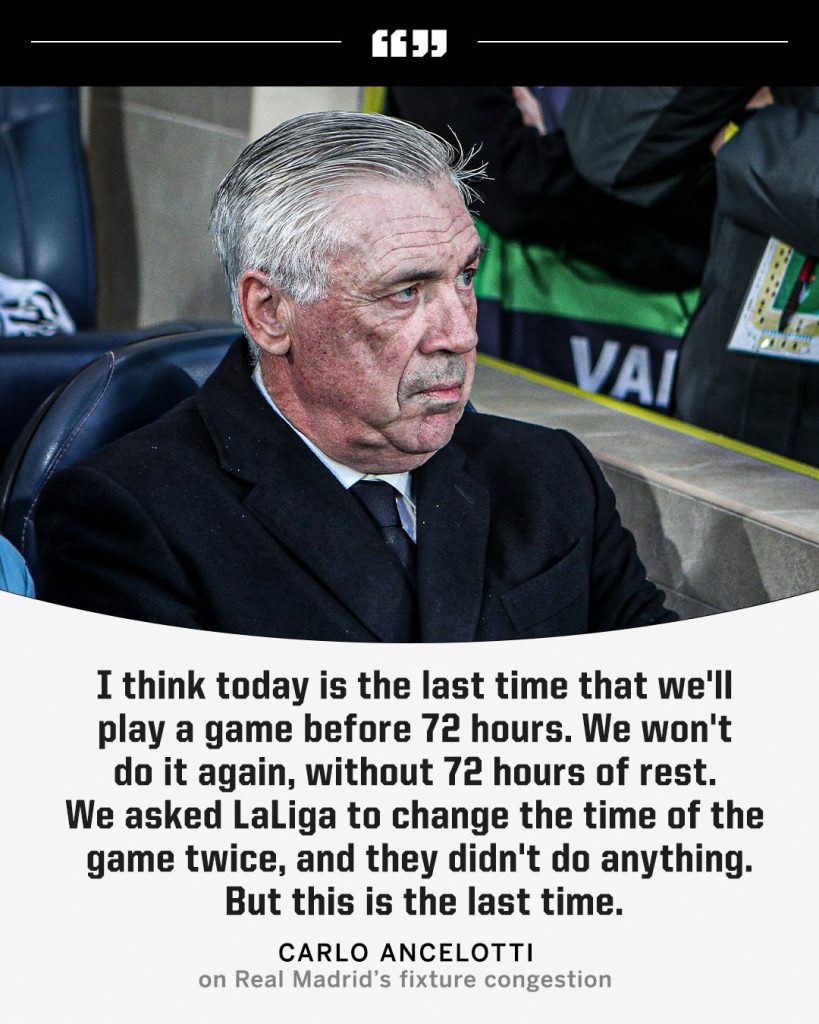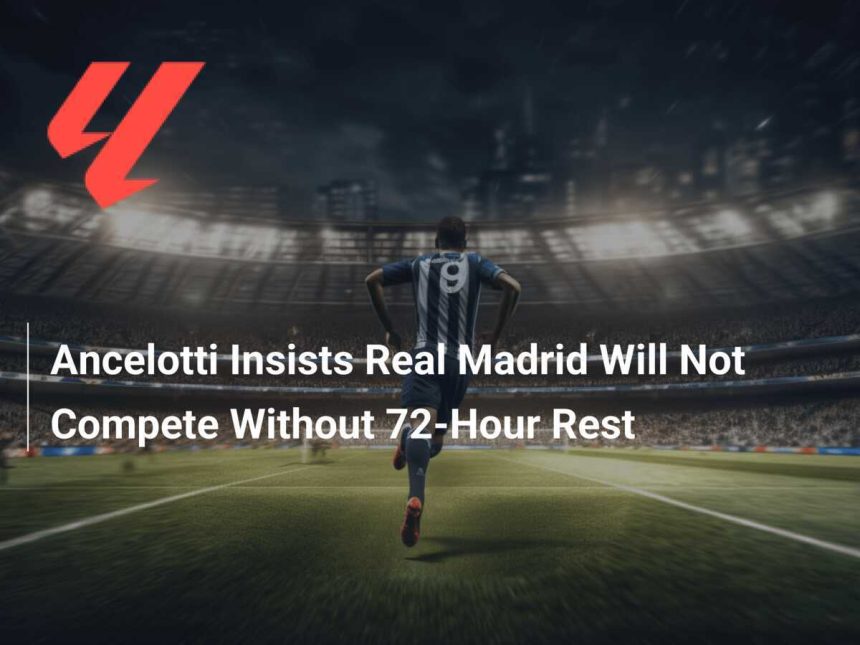Real Madrid Rejects 72-Hour Match Schedule Over Player Fatigue Concerns
In the fast-paced world of football, managing player fitness is just as crucial as scoring goals. But what happens when scheduling demands start to take a toll on players’ health? Real Madrid is making headlines for refusing to accept a game in the future before a minimum of 72-hour rest in the match schedule, citing concerns over player fatigue and injury risks.
Could this move set a precedent for other top clubs? Let’s dive into the details.
Why Real Madrid Said “No” to the Packed Schedule
Recently, Real Madrid found themselves facing a tough situation: playing matches below 72 hours apart. Los Blanco’s who on Wednesday night battled 120 min against their capital rival Atlético Madrid in the UEFA Champions League Round of 16-second leg scheduled at 9:00 pm, were scheduled to play against Villareal on Saturday at 6:30 pm local time which was less than 72 hours rest, a mandate set by the World Football Governing Organization FIFA They pushed back, arguing that such a tight schedule isn’t fair to players, who need time to rest and recover between games.

What’s the Big Deal About a 72-Hour Turnaround?
To the average fan, playing two games in three days might not seem extreme. But for top athletes performing at the highest level, recovery time is essential. Without proper rest, players face:
- Increased risk of muscle injuries
- Mental exhaustion affects focus and decision-making
- Decreased performance levels
Let’s put it this way—imagine running a marathon, only to be told you have to sprint another race just a day later. That’s the kind of strain elite players deal with when matches come too close together.
The Science Behind Recovery in Football
Playing football at an elite level isn’t just about skill—it’s also about endurance. Studies show that high-intensity sports like football require at least 72–96 hours for full muscle recovery. Without this time, players will step onto the pitch feeling sore, sluggish, and more vulnerable to injury.
Some key recovery factors:
- Rehydration and refueling after matches
- Muscle repair through stretching and physiotherapy
- Mental reset to stay sharp for the next challenge
When teams are forced to play back-to-back games, these crucial recovery processes are compromised. And when a squad doesn’t have enough time to heal, the risk of long-term injuries skyrockets.
How Packed Schedules Impact Players
Footballers aren’t just athletes—they’re humans, too. When you see them sprinting across the field, making game-changing plays, it’s easy to forget the toll these performances take on their bodies.
Check Out: Injury Puts Off Neymar’s Return to the Grazes of Brazil
Increased Risk of Injuries
Fatigue leads to poor reactions, and poor reactions lead to injuries. Players like Eden Hazard and Gareth Bale, both former Real Madrid stars, have faced injuries from intense playing schedules. Could heavy match loads be a hidden cause of these frequent setbacks?
Mental and Emotional Fatigue
Football isn’t just a physical game—it’s also mentally demanding. Performing at the highest level requires focus, strategy, and split-second decision-making. When fatigue sets in, so do mistakes. And for clubs like Real Madrid, those mistakes can be costly.
Football Schedules: Is This an Unfair Trend?
Real Madrid’s stand against the 72-hour match schedule isn’t just about their own players—it sparks a broader debate. Is modern football pushing athletes too hard?

The reality is, that many competitions, from La Liga to the Champions League, pack their schedules fiercely. Teams playing in multiple tournaments often see themselves crammed with matches, sometimes playing three games per week.
Other clubs have raised similar concerns, yet few dare to challenge the system as openly as Real Madrid. Their refusal might encourage change—or at least begin an important conversation.
What Could This Mean for Football?
Real Madrid’s stance may force governing bodies to rethink football scheduling. Could we see leagues making changes to protect players’ well-being? Some possible improvements include:
- Extending match recovery times to at least 96 hours
- Flexible scheduling for clubs involved in multiple competitions
- More consideration for player health when drafting league calendars
If more teams take a stand, the change could be inevitable.
Also Read About: KSI slaps Dillon Danis in the press conference. How will the match play out?
A Bold Move Towards a Healthier Future
Real Madrid rejecting the 72-hour match schedule isn’t just about their squad—it’s about prioritizing the health and future of all professional footballers.
With elite players pushing their bodies to the limit, leagues and federations must step up. If adjustments aren’t made, we could see more injuries, shorter careers, and, ultimately, a decline in match quality.
📢 What do you think? Should football leagues adjust their schedules for player welfare? Share your thoughts in the comments below!






